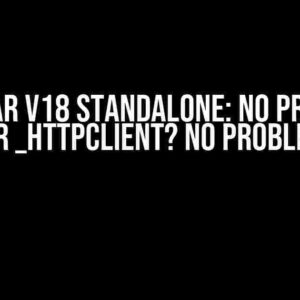Are you tired of encountering frustrating Webpack errors while trying to integrate Google Auth Library with Angular 18? You’re not alone! In this comprehensive guide, we’ll delve into the world of Webpack, Angular, and Google Auth Library, providing you with clear instructions and explanations to overcome these pesky errors.
- The Problem: Webpack Errors with Google Auth Library
- Understanding Webpack and Google Auth Library
- Solution 1: Resolving Dependencies with Webpack Aliases
- Solution 2: Using the `browser` Field in `package.json`
- Solution 3: Creating a Custom Webpack Plugin
- Solution 4: Downgrading Google Auth Library
- Conclusion
- Bonus: Troubleshooting Tips
The Problem: Webpack Errors with Google Auth Library
When attempting to use Google Auth Library with Angular 18, you might encounter errors similar to:
ERROR in ./node_modules/google-auth-library/build/src/auth/googleauth.js Module not found: Error: Can't resolve 'stream' in '/node_modules/google-auth-library/build/src/auth' ERROR in ./node_modules/google-auth-library/build/src/auth/index.js Module not found: Error: Can't resolve 'crypto' in '/node_modules/google-auth-library/build/src/auth'
These errors occur because Webpack, Angular’s default bundler, struggles to resolve dependencies required by Google Auth Library. Fear not, dear developer, for we’re about to embark on a thrilling adventure to conquer these errors!
Understanding Webpack and Google Auth Library
Before we dive into the solutions, let’s quickly recap the roles of Webpack and Google Auth Library in our Angular 18 project:
- Webpack: A popular bundler and build tool responsible for packaging our Angular application’s code, including dependencies, into a single file.
- Google Auth Library: A JavaScript library providing authentication functionality for Google services, such as Google Sign-In and OAuth 2.0.
In an ideal world, Webpack would seamlessly bundle the Google Auth Library, allowing our Angular application to leverage its authentication capabilities. However, as we’ve seen, this isn’t always the case.
Solution 1: Resolving Dependencies with Webpack Aliases
One approach to resolving Webpack errors is by creating aliases for the troublesome dependencies. Let’s add the following configuration to our `webpack.config.js` file:
module.exports = {
// ... other configurations ...
resolve: {
alias: {
stream: 'stream-browserify',
crypto: 'crypto-browserify'
}
}
};
In this example, we’re telling Webpack to alias the `stream` and `crypto` dependencies to their browser-friendly counterparts, `stream-browserify` and `crypto-browserify`, respectively. This should help Webpack resolve the dependencies and eliminate the errors.
Solution 2: Using the `browser` Field in `package.json`
An alternative approach is to modify the `browser` field in our `package.json` file to specify browser-specific versions of the dependencies:
{
"name": "my-angular-app",
"version": "0.0.0",
"dependencies": {
"google-auth-library": "^0.10.0",
"stream-browserify": "^3.0.0",
"crypto-browserify": "^3.12.0"
},
"browser": {
"stream": "stream-browserify",
"crypto": "crypto-browserify"
}
}
By specifying the `browser` field, we’re informing Webpack to use the `stream-browserify` and `crypto-browserify` packages when bundling our application for the browser.
Solution 3: Creating a Custom Webpack Plugin
If the above solutions don’t work for you, it’s time to get creative and develop a custom Webpack plugin. Create a new file, `google-auth-library-webpack-plugin.js`, with the following content:
const webpack = require('webpack');
class GoogleAuthLibraryWebpackPlugin {
apply(compiler) {
compiler.plugin('module', (module) => {
if (module.userRequest === 'google-auth-library') {
module.loaders.push({
loader: 'transform-runtime-loader',
options: {
helpers: true,
proto: false,
unsafe: false
}
});
}
});
}
}
module.exports = GoogleAuthLibraryWebpackPlugin;
This custom plugin utilizes the `transform-runtime-loader` to ensure that the `google-auth-library` module is properly transformed for the browser.
Next, add the plugin to our `webpack.config.js` file:
module.exports = {
// ... other configurations ...
plugins: [
new GoogleAuthLibraryWebpackPlugin()
]
};
With this custom plugin in place, Webpack should now be able to successfully bundle the Google Auth Library.
Solution 4: Downgrading Google Auth Library
If all else fails, you can try downgrading the Google Auth Library to a version that’s more compatible with your Angular 18 project. This might not be the most ideal solution, but it can serve as a temporary workaround:
npm uninstall google-auth-library npm install [email protected]
Keep in mind that downgrading might introduce other compatibility issues or security vulnerabilities, so proceed with caution.
Conclusion
We’ve explored four solutions to overcome Webpack errors when using Google Auth Library with Angular 18. By understanding the intricacies of Webpack and Google Auth Library, we’ve been able to craft clever workarounds to resolve these pesky errors.
Remember, the key to success lies in patience, persistence, and a willingness to experiment with different approaches. Don’t be afraid to try out these solutions and adapt them to your specific use case.
Bonus: Troubleshooting Tips
When troubleshooting Webpack errors, keep the following tips in mind:
- Check the Webpack version: Ensure you’re using the latest version of Webpack.
- Verify dependencies: Double-check that all dependencies, including Google Auth Library, are correctly installed and up-to-date.
- Review `webpack.config.js`: Scrutinize your Webpack configuration file for any potential issues or conflicts.
- Consult the Webpack documentation: Webpack’s official documentation is an invaluable resource for resolving errors and optimizing your build process.
By following these tips and exploring the solutions outlined in this article, you’ll be well-equipped to tackle any Webpack errors that come your way.
| Solution | Description |
|---|---|
| Webpack Aliases | Create aliases for problematic dependencies (e.g., stream and crypto) |
| `browser` Field | Specify browser-specific versions of dependencies in `package.json` |
| Custom Webpack Plugin | Develop a custom plugin to transform the Google Auth Library module |
| Downgrade Google Auth Library | Downgrade the Google Auth Library to a compatible version (temporary workaround) |
Frequently Asked Question
Are you tired of dealing with Angular 18 google-auth-library errors? Don’t worry, we’ve got you covered! Here are the top 5 questions and answers to help you troubleshoot and resolve those pesky errors.
Q1: Why am I getting a “TypeError: Cannot read property ‘redirectUri’ of undefined” error?
This error usually occurs when the Google Auth library is not properly imported or initialized in your Angular 18 project. Make sure to import the library correctly and initialize it in your app module. You can also try updating the library to the latest version.
Q2: How do I resolve the “Error: Cannot find name ‘gapi'” error?
This error typically occurs when the Google API JavaScript client library is not loaded correctly. Try adding the script tag for the Google API library in your index.html file, or use a bundler like Webpack to load the library correctly.
Q3: Why am I getting a “TypeError: Cannot read property ‘ authorizationEnabled’ of undefined” error?
This error usually occurs when the Google Auth library is not properly initialized or configured. Make sure to initialize the library with the correct client ID and scopes, and check that the authorizationEnabled property is set correctly.
Q4: How do I fix the “Error: Cannot find module ‘google-auth-library'” error?
This error typically occurs when the Google Auth library is not installed or imported correctly. Make sure to install the library using npm or yarn, and import it correctly in your Angular 18 project.
Q5: Why am I getting a “Error: Webpack Error [google-auth-library]: Can’t resolve ‘google-auth-library'” error?
This error usually occurs when Webpack is not configured correctly to handle the Google Auth library. Try updating your Webpack configuration to include the necessary aliases and modules for the Google Auth library.







